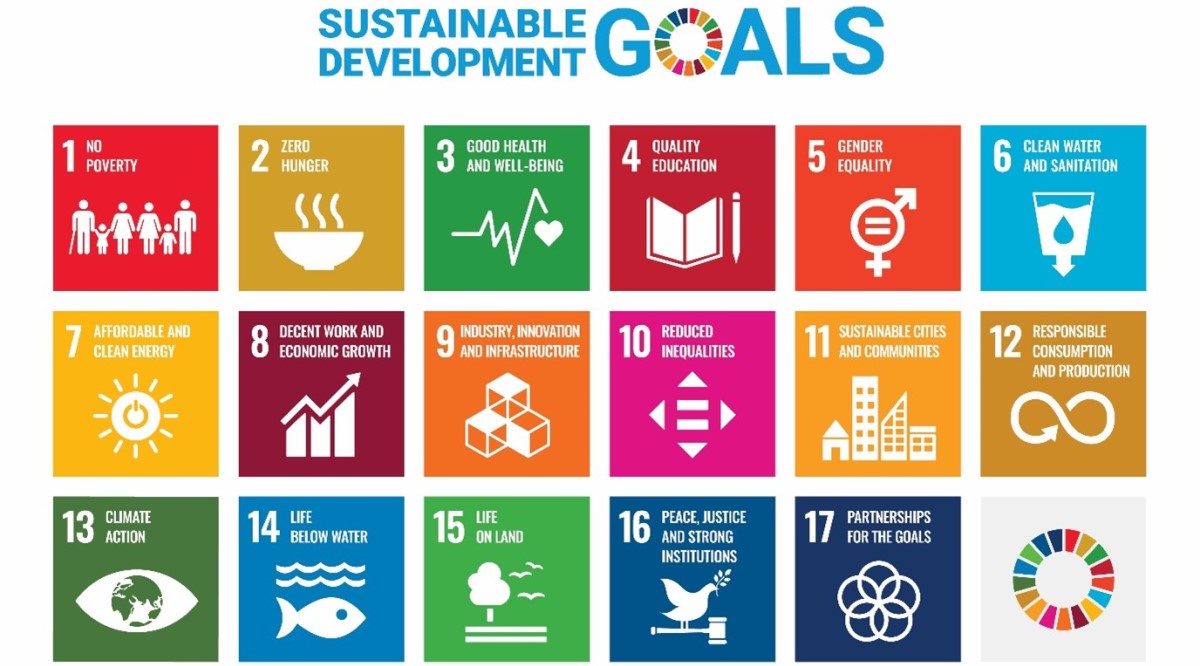As explained by United Nations Foundation, “The Sustainable Development Goals (SDGs) are the world’s shared plan to end extreme poverty, reduce inequality, and protect the planet by 2030.”
The SDGs, also referred to as the Global Goals, are 17 goals with 169 targets that all United Nations (UN) Member States have agreed to work towards achieving by the year 2030. They are a guide for the world to address global challenges facing the international community and are an urgent call for action to be taken by all countries - developed and developing - in a global partnership. The 17 goals cover all three pillars of sustainability: environment, economic and social.
 The 17 SDGs:
The 17 SDGs:
References:
United Nations, The 17 Goals, https://sdgs.un.org/goals, [Accessed 04 January 2022]
United Nations Development Programme, The SDGS in action, https://www.undp.org/sustainable-development-goals, [Accessed 04 January 2022]
Sengupta, S., 2021 The relevance of the Sustainable Development Goals (SDGs) for companies, https://www.17goalsmagazin.de/en/the-relevance-of-the-sustainable-development-goals-sdgs-for-companies/, [Accessed 04 January 2022]
 The 17 SDGs:
The 17 SDGs:
Goal 1: No Poverty
End poverty in all its forms everywhereGoal 2: Zero Hunger
End hunger, achieve food security and improved nutrition and promote sustainable agricultureGoal 3: Good Health and Well-being
Ensure healthy lives and promote well-being for all at all agesGoal 4: Quality Education
Ensure inclusive and equitable quality education and promote lifelong learning opportunities for allGoal 5: Gender Equality
Achieve gender equality and empower all women and girlsGoal 6: Clean Water and Sanitation
Ensure availability and sustainable management of water and sanitation for allGoal 7: Affordable and Clean Energy
Ensure access to affordable, reliable, sustainable and modern energy for allGoal 8: Decent Work and Economic Growth
Promote sustained, inclusive and sustainable economic growth, full and productive employment and decent work for allGoal 9: Industry, Innovation and Infrastructure
Build resilient infrastructure, promote inclusive and sustainable industrialization and foster innovationGoal 10: Reduced Inequalities
Reduce income inequality within and among countriesGoal 11: Sustainable Cities and Communities
Make cities and human settlements inclusive, safe, resilient and sustainableGoal 12: Responsible Consumption and Production
Ensure sustainable consumption and production patternsGoal 13: Climate Action
Take urgent action to combat climate change and its impacts by regulating emissions and promoting developments in renewable energyGoal 14: Life Below Water
Conserve and sustainably use the oceans, seas and marine resources for sustainable developmentGoal 15: Life on Land
Protect, restore and promote sustainable use of terrestrial ecosystems, sustainably manage forests, combat desertification, and halt and reverse land degradation and halt biodiversity lossGoal 16: Peace, Justice and Strong Institutions
Promote peaceful and inclusive societies for sustainable development, provide access to justice for all and build effective, accountable and inclusive institutions at all levelsGoal 17: Partnerships for the Goals
Strengthen the means of implementation and revitalize the global partnership for sustainable development The SDGs build on decades of work by countries and the UN. If you would like to learn more about how the SDGs evolved click here.SIGN UP FOR OUR NEWSLETTER
The information contained herein is for general information purposes only. APS Bank plc will not be held responsible or liable in any manner for any of the information contained herein. While APS Bank plc has made every attempt to ensure that the information contained herein has been obtained from reliable sources, APS Bank plc will not be held responsible for any errors, omissions or inaccuracy, or for the results obtained from the use of this information. The primary purpose of these articles is to educate and inform. These articles do not constitute legal, medical or professional advice or service.

